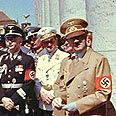
Nazis ‘shipped arms to Palestinians’
British National Archives unveil presence of Nazi S.S. agents in Mandatory Palestine, working closely with Palestinian leaders
A British Foreign Office report from 1939 reports of “news of a consignment of arms from Germany, sent via Turkey and addressed to Ibn Saud (king of Saudi Arabia), but really intended for the Palestine insurgents.” Britain’s chief military officer in Mandatory Palestine also noted reports “regarding import of German arms at intervals for some years now.”
British documents from the same period, and German records photographed by an American spy and sent to the British government, said that a number of Nazi agents were sent to Mandatory Palestine, in order to forge alliances with Palestinian leaders, and urge them to reject a partition of the land between the Jewish and Arab populations.
One Nazi agent, Adam Vollhardt, arrived in Palestine in July 1938, and was reported to have gained strong influence with Arab leaders, meeting with Palestinian leaders throughout 1938. Vollhardt held several meetings with leading Arab politicians and told them “that the Palestine question would be settled to the satisfaction of the Arabs within a few weeks,” adding that “it would be fatal to their (Palestinians’) cause if at this juncture they showed any signs of weakness or exhaustion.”
“Germany was interested in the settlement of the (Palestine) question on the basis of the Arabs obtaining their full demands,” Vollhardt was reported to say to Palestinian leaders, according to a report by the British War Office. Vollhardt also assured Arab leaders that “the Germans could continue to support the Palestinian Arab cause by means of propaganda.”
German documents photographed and sent to Whitehall by an American spy revealed that in 1937, German officials had calculated that “Palestine under Arab rule would… become one of the few countries where we could count on a strong sympathy for the new Germany.”
‘Arabs admire our Fuhrer’
“The Palestinian Arabs show on all levels a great sympathy for the new Germany and its Fuhrer, a sympathy whose value is particularly high as it is based on a purely ideological foundation,” a Nazi official in Palestine wrote in a letter to Berlin in 1937. He added: “Most important for the sympathies which Arabs now feel towards Germany is their admiration for our Fuhrer, especially during the unrests, I often had an opportunity to see how far these sympathies extend. When faced with a dangerous behaviour of an Arab mass, when one said that one was German, this was already generally a free pass.”
A second Nazi agent, Dr. Franz Reichart, was reported to be actively working with Palestinian Arabs by the British Criminal Investigation Division “to help coordinate Arab and German propaganda.” Reichart was also head of the German Telegraphic Agency in Jerusalem.
German records show that the Nazis viewed the establishment of a Jewish state with great concern. A 1937 report from German General Consulate in Palestine said: “The formation of a Jewish state… is not in Germany’s interest because a (Jewish) Palestinian state would create additional national power bases for international Jewry such as for example the Vatican State for political Catholicism or Moscow for the Communists. Therefore, there is a German interest in strengthening the Arabs as a counter weight against such possible power growth of the Jews.”
Jewish refugees abandoned
The records also show that the news of increased Nazi-Arab cooperation panicked the British government, and caused it to cancel a plan in 1938 to bring to Palestine 20,000 German Jewish refugees, half of them children, facing danger from the Nazis.
Documents show that after deciding that the move would upset Arab opinion, Britain decided to abandon the Jewish refugees to their fate.
“His Majesty’s Government asked His Majesty’s Representatives in Cairo, Baghdad and Jeddah whether so far as they could judge, feelings in Egypt, Iraq, and Saudi Arabia against the admission of, say 5,000 Jewish children for adoption… would be so strong as to lead to a refusal to send representatives to the London discussions. All three replies were strongly against the proposal, which was not proceeded with,” a Foreign Office report said.
“If war were to break out, no trouble that the Jews could occasion us, in Palestine or elsewhere, could weigh for a moment against the importance of winning Muslim opinion to our side,” Britain’s Minister for Coordination of Defence, Lord Chatfield, told the British cabinet in 1939, shortly before Britain reversed its decision to partition its mandate, promising instead all of the land to the Palestinian Arabs.










